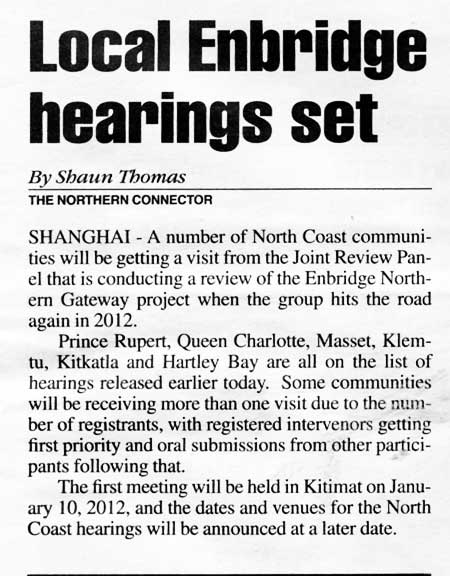Editorial
In the past few days there has been a lot of comment from politicians, pundits, columnists and business analysts about “fast tracking” the Northern Gateway pipeline project now that the United States has postponed approval of the Keystone XL pipeline.
If anyone wanted proof that these people are completely out of touch with reality, the past three days has proven it beyond any reasonable doubt–and it has absolutely nothing to do with politics.
For the purposes of this editorial, let’s assume, just for the sake of argument, that there was no opposition, but one hundred per cent support for Enbridge’s project to build the pipeline from the Alberta bitumen sands to the port of Kitimat. Let’s assume that the Minister of Natural Resources, Joe Oliver, was successful, as he is quoted today, in expediting the approval process by the Northern Gateway Joint Review Process.
After all that, could the Northern Gateway be “fast tracked?”
No.
Let’s ignore, for this argument, any of the objections that the environmental movement has raised against the pipeline.
Let’s instead take one argument that Enbridge has used to promote the pipeline project, that the Northern Gateway is another “national dream,” the equivalent of building the Canadian transcontinental railway more than a century ago.
The problem with the majority of economists, as always, is that they think that they are dealing with a spreadsheet not the real world. Just move everything from the Keystone column to the Northern Gateway column. The bitumen goes to China instead of Texas, and the money rolls in.
The problem with cabinet ministers like Joe Oliver and Jim Flaherty, proponents of fast tracking the pipeline, is that either they are not getting the proper briefing notes or they are ignoring those briefing notes. (That is scary when it comes to Flaherty since he is supposed to be guiding the Canadian economy).
As noted earlier, the business columnists and analysts don’t even bother to read the technical studies posted by Enbridge on the Northern Gateway Joint Review site.
The bitumen pipeline is planned to cross 1,172 kilometres of challenging terrain from the bitumen sands to Kitimat. The parallel condensate pipeline is planned to cover 1,172 kilometres from Kitimat to the bitumen sands
.
Why does Enbridge call the pipelines the equivalent of the great railway construction of the nineteenth century?
The pipelines will have to cross some of the most rugged territory on this planet; mountain ranges, including the Rocky Mountains, The Bulkley Ranges, the Coast Ranges.
Even the valleys and plateaus the pipeline must cross are considered geologically unstable.
The weather is often terrible. Rain. Snow. More rain. Wind storms. Lots and lots of rain. The pipeline will come to close to Lakelse Lake, just east of Kitimat, that has a Canadian record for a one day snowfall, 118 centimetres.
Just ask DriveBC how difficult it is to maintain the highways in this region, highways that have been around for at least 60 years and where the engineering has improved over those decades from the tracks my family drove when I was a kid. Washouts happen, even in “mild” years.
Then there’s the possibility of earthquakes. As Enbridge, correctly, points out, the tectonic plates where the major quakes can be triggered are far off shore and at least according to the maps, the pipeline is not in a quake zone. Yet Kitimat was badly shaken by the magnitude 9.2 1964 Good Friday earthquake in Anchorage, thousands of kilometres away.
So terrain, weather (summer or winter) and even earthquakes could hold up construction.
The building of the Canadian Pacific Railway was held up, not just by the challenging terrain but by the Northwest Rebellion, financial mismanagement by the CPR, (they ran out of money) and political scandal. That was in the nineteenth century when health and safety regulations were non existent and no environmental precautions were required.
Some of the first locomotives and rolling stock were not built for crossing some of the biggest mountain ranges on Earth.
Yes the CPR was built. It didn’t come in on time and on budget. The CPR certainly wasn’t “fast tracked.”
In the end one has to wonder if any of the politicians, pundits, columnists and analysts who are so certain they can fast track the Northern Gateway pipeline have attempted a home renovation. Perhaps they should try to finish their basements before pronouncing on building a pipeline fast tracked across the west.
 Actually, of course, the NEB remains in Calgary and
Actually, of course, the NEB remains in Calgary and 
